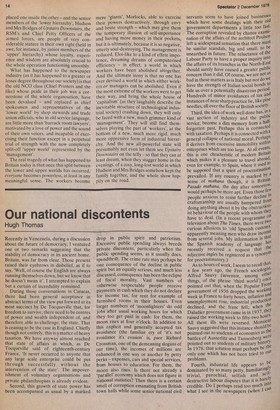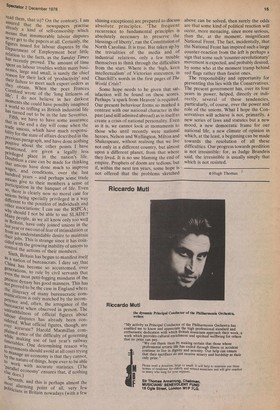Our national discontents
Hugh Thomas
Recently in Venezuela, during a discussion about the future of democracy, I ventured one or two remarks suggesting that the stability of democracy in its ancient home, Britain, was far from clear. Those present raised their eyebrows in disbelief, as if to say, 'Well, of course the English are always running themselves down, but we know that he doesn't mean it'. I attempted to explain but a curtain of incredulity remained.
During those conversations in Caracas, there had been general acceptance in abstract terms of the view put forward at its most succinct by De Tocqueville that, for freedom to survive, there need to be centres of power and wealth independent of, and therefore able to challenge, the state. That is ceasing to be the case in England. Chiefly though not entirely, this is a matter of heavy taxation. We have anyway almost reached that state of affairs in which, as De Tocqueville said of eighteenth-century France, 'It never occurred to anyone that any large scale enterprise could be put through successfully without the intervention of the state'. The impoverishment of voluntary organisations and private philanthropists is already evident.
Second, this growth of state power has been accompanied as usual by a marked drop in public spirit and patriotism. Excessive public spending always breeds private discontent, particularly when the public spending seems, as it usually does, spendthrift. The crime rate may perhaps be one consequence of the decline in public spirit but an equally serious, and much less discussed, consequence has been the eclipse of fiscal morality. Vast numbers of otherwise respectable people receive payments in cash which they do not declare for income tax, for rent for example of furnished rooms in their houses. Even larger numbers of 'moonlighters' do odd jobs after usual working hours for which they too get paid in cash: for them, the moon rises at four o'clock. In addition to this explicit and generally accepted tax avoidance (the familiar cry of 'it's not avoidance it's evasion' is, pace Richard Crossman, one of the demeaning slogans of our time), the incomes of millions are enhanced in one way or another by petty perks — expenses, cars and special services, from houses to education. For them, the moon also rises. Is there not already a 'parallel' economy which does not figure in national statistics? Then there is a certain smell of corruption emanating from British town halls while some senior national civil servants seem to have joined businesses which have some dealings with their old government departments a little too fast. The corruption revealed by chance examination of the affairs of the architect Poulson left a widespread sensation that there must be similar scandals, big and small, to be unearthed in future. The reluctance of the Labour Party to have a proper inquiry the affairs of its branches in the North-East should surely have caused a greater public concern than it did. Of course, we are not as bad in these matters as is Italy but nor do we have the strength of Italian social bonds to tide us over a potentially disastrous period. Hundreds of minor avoidances of tax and instances of near sharp practice lie, like pine needles, all over the floor of British society.
Third, the idea of work well done has, in a vast section of industry and the public service, become a dim memory from a bait forgotten past. Perhaps this is connected with taxation. Perhaps it is connected with a general collapse of national moral. PerhaPs it derives from excessive immobility within enterprises which are too large. At all events, this is one chracteristic of modern Britain which makes it a pleasure to travel abroad, even for example, to Spain, where it used to be supposed that a spirit of procrastination prevailed. If any country is marked by a sense of mahana though, it is Britain. Pasado mahana, the day after tomorrow, would perhaps be more apt. Even those fe"''' people anxious to resist further decline in craftsmanship are usually hampered fru° doing anything about it by the obstructionist behaviour of the people with whom the)" have to deal. (In a recent programme nil television about The Times, there were toi°, curious allusions to 'old Spanish custonis apparently meaning men who draw income from several jobs. My information is that the Spanish academy of language has. recently received a request that the adjective ingles be registered as a synorlYin for procrastinatory.) As to hours of work, I seem to recall that, a few years ago, the French sociologist' Alfred Sauvy (inventor, among other things, of the phrase 'third world') °nee, pointed out that, when the Popular Fr"' government of 1936 dropped the work'll week in France to forty hours, inflation an unemployment rose, industrial production declined, and the franc fell; when the Daladier government came in in 1937, they raised the working week to fifty-two hours. All these ills were reversed. Monsieur Sauvy suggested that this instance should be pointed out to students of economics as the battles of Austerlitz and Tannenberg were pointed out to students of military history. In 1978, that solution must perhaps be the only one which has not been tried to our problems. Fourth, industrial life appears to be dominated by so many petty, humiliatinglY trivial, parochial, selfish and self' destructive labour disputes that it is barelY credible. Do I perhaps read too much int° what I see in the newspapers (when I 00 read them, that is)? On the contrary, I am assured that the newspapers practise already a kind of self-censorship which means that innumerable labour disputes never get to the papers at all. Certainly, the figures issued for labour disputes by the Department of Employment bear little relation to the facts, as the Sunday Times has recently proved. The amount of time spent on labour troubles within many businesses, large and small, is surely the chief reason for their lack of 'productivity' and their failure to meet such export orders as they obtain. When the poet Frances Cornford wrote of the 'long littleness of life', I do not believe in her darkest moments she could have possibly imagined a world so trifling as British industrial life has turned out to be in the late Seventies. Fifth, we have to have some assurance that in the end a day will come when the trade unions, which have much responsibility for the state of affairs described in the previous paragraph, and have done nothing Positive about the other points I have mentioned are given a legally less P,rivileged place in the nation's life. uoubtless a case can be made for thinking that unions have done much to improve wages, and conditions, over the last hundred years — and perhaps same trade unions give to their members a sense of Participation in the banquet of life. Even so, there is clearly now no moral case for unions being specially privileged in a way different to the position of individuals and Other associations: I can sue the RSPCA; wt.ny should I not be able to sue SLADE? ?laity People, as we all know only too well rn Britain, have only joined unions in the last year or two out of fear of intimidation or fr,tn n, an understandable desire to maintain their jobs. This is strange since it has coincided with the growing inability of unions to control the actions of their members. Sixth, Britain has begun to manifest itself as a nation of bureaucrats. I dare say that China has become so accustomed, over generations, to rule by civil servants that even the most petti-fogging mandarin of the Present dynasy has good manners. This has not proved to be the case in England where the illiteracy of many bureaucratic communications is only matched by the incompetence and, often, the arrogance of the bureaucrat when observed in person. The labour of official figures about _,hour disputes has already been considered, What official figures, though, are ever accurate? Harold Macmillan comWthaUled once of the difficulty of governing *.hile making use of last year's railway Linietables. One determining reason why tgo°vernments should avoid at all costs trying L manage an economy is that they cannot, uY the nature of things, hope ever to be able t ,° work with accurate statistics. (The Parallel economy' ensures that, if nothing else does.) Seventh, and this is perhaps almost the In„,_11t. alarming point of all, very few Politicians in Britain nowadays (with a few shining exceptions) are prepared to discuss absolute principles. 'The frequent recurrence to fundamental principles is absolutely necessary to preserve the blessings of liberty', ran the Constitution of North Carolina. It is true. But taken up by the trivialities of the media and of industrial relations, only a few trouble themselves to think through the difficulties from the start. Where is the 'high, keen intellectualism' of Victorian statesmen, in Churchill's words in the first pages of The World Crisis?
Some hope needs to be given that satisfaction will be found on these scores. Perhaps 'a spark from Heaven' is required. Our present behaviour forms so marked a contrast with our national character in the past (and still admired abroad) as in itself to create a crisis of national personality. Even as it is, we cannot look at monuments to those who until recently were national heroes, Nelson and Wellington, Milton and Shakespeare, without realising that we live not only in a different country, but almost upon a different planet, from that where they lived. It is no use blaming the end of empire. Prophets of doom are tedious, but if, within the next ten years, some hope is not offered that the problems sketched above can be solved, then surely the odds are that some kind of political reaction will occur, more menacing, since more serious, than the, at the moment, insignificant National Front. The fact, incidentally, that the National Front has inspired such a large counter-reaction from the left is perhaps a sign that some such 'counter-revolutionary' movement is expected, and probably desired, by some who at the moment tramp behind red flags rather than fascist ones. The responsibility and opportunity for preventing this lies with the Conservatives. The present government has, over its four years in power, helped, directly or indirectly, several of these tendencies, particularly, of course, over the power and role of the unions. What I hope the Conservatives will achieve is not, primarily, a new series of laws and statutes but a new mood, a new democratic frame for our national life, a new climate of opinion in which, at the least, a beginning can be made towards the resolution of all these difficulties. Our progress towards perdition is not irresistible: for, as Judge Brandeis said, the irresistible is usually simply that which is not resisted.







































 Previous page
Previous page